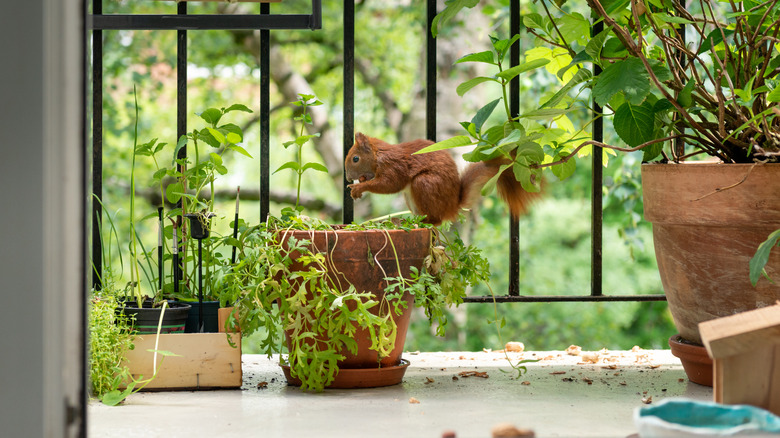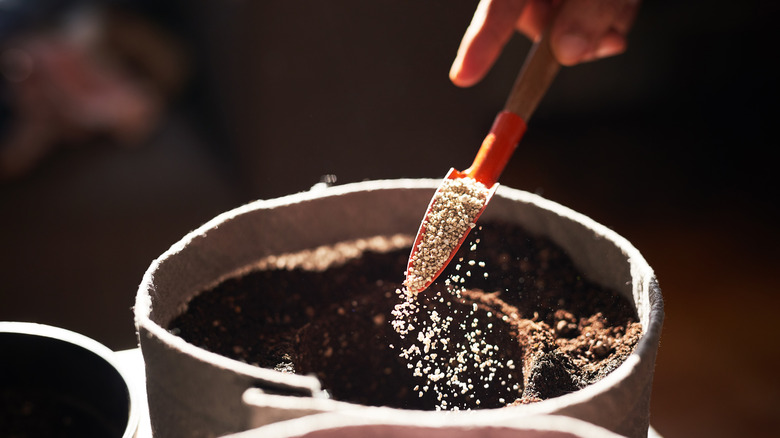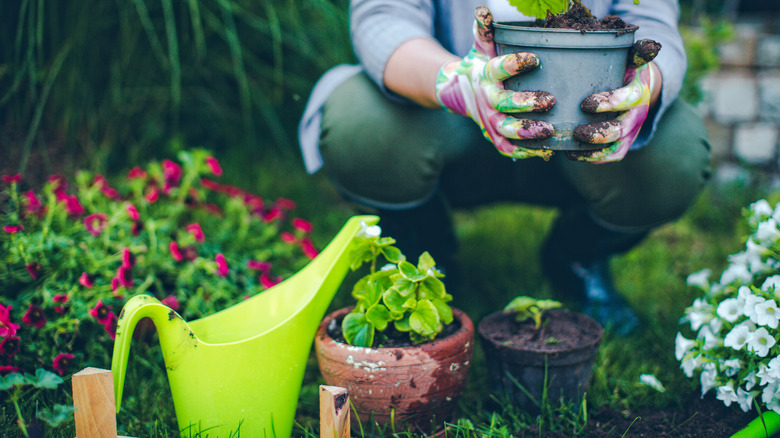What To Know Before Using Blood Meal To Keep Squirrels Out Of Your Flower Pots
It sounds like something out of a cartoon: pesky squirrels wreaking havoc in your flower pots and leaving you to shake your fist at the chaos they left behind. While this image might be funny to some, if you have a squirrel problem in your garden, it's likely no laughing matter. These cute but annoying critters can bury their snacks and goods in your potted plants, pull the flowers or foliage from the soil, and leave your curated blooms in ruins. You may have heard of using coffee grounds to keep squirrels out of plant pots, but did you know that blood meal deters squirrels from using your plants' pots as storage units, too? As with any method, there are some points to consider before you introduce this as an option. Not only is this product toxic to some domesticated animals, but it requires regular maintenance to provide effective results.
Despite the drawbacks, blood meal might be a great option for preserving your potted plants against prying paws. Common things that attract squirrels to your yard include flowers and herbs, some of which you might have in pots. For those who are squeamish, using fertilizer made from meat-packing plants' byproducts might not sound ideal, but this dried blood is great for giving plants nitrogen. On top of that, it keeps squirrels away, thanks to its smell, which is off-putting to these furry creatures.
Tips to keep in mind when using blood meal
It's always good to know the facts before introducing a product into your home and garden. While blood meal can help keep squirrels out of your potted plants, it's important to remember that this fertilizer can be bad for your dogs and cats, causing issues like bloating, nausea, and even diarrhea. Because it is made from animal blood, the smell might entice animals to eat it, but this is something you want to avoid. If your pets don't show interest in the blood meal or aren't curious eaters, this might be worth trying to prevent your plants' premature deaths.
The other point to consider is that the smell can also be very strong to humans, so if you are sensitive to scents, this could create an unappealing atmosphere in your garden. When this fertilizer gets wet, the smell is amplified, so if you live in a rainy area, this is something to keep in mind. Whenever blood meal comes into contact with moisture and water, you will need to reapply it. Otherwise, the strong scent keeping squirrels away will dissipate as it dries, and its effectiveness is not as potent after being washed out.
Your plants could benefit from this fertilizer
Since blood meal is a fertilizer, using it in your garden will affect each of your plants differently. Certain vegetable species like squash, tomatoes, and eggplant can benefit from its nitrogen content, while rhododendrons, daffodils, and hydrangeas might flourish from its phosphorous-rich chemistry in their second season. Peas and beans do not benefit from blood meal, and if you are growing these or seedlings in pots, you shouldn't fertilize them with it. Legumes' roots send the nitrogen back to the soil they are living in, which can negatively affect the ecosystem of the planter.
If you still want to try blood meal on furry pests, keep potted plants with blood meal on a table or pedestal away from your pets, with fresh replacements ready should your plants incur inclement weather. For plants that have been established within their containers, you can add 1 teaspoon of blood meal per 1 gallon of soil every month, only adding more if it gets washed away. Combining blood meal with an addition, like sensor sprinklers, will keep squirrels out of your pots and maybe even out of your yard completely. Just keep the pots away from the sprinklers to avoid more work and maintenance. When blood meal is not in use, storage is important to ensure it can continue to do its job. It's best kept somewhere dry and cool to protect the high amounts of nitrogen and other elements making up this fertilizer.


